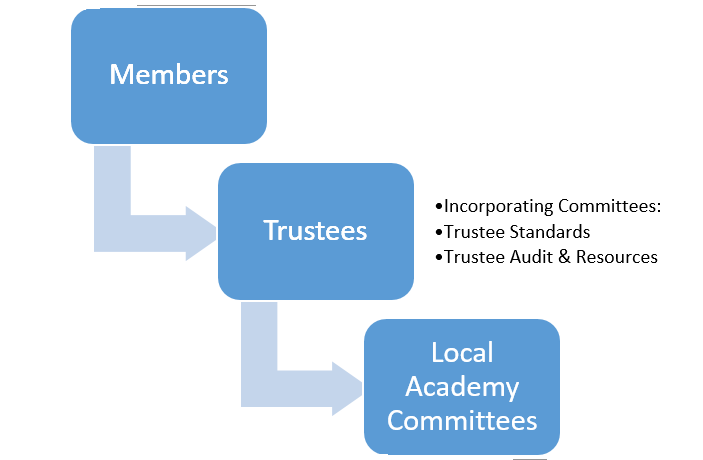Governance
How we are governed
All Aspire academies are part of a single charitable company known as the Aspire Educational Trust. Our principal regulator is the Department for Education.
Good governance is at the heart of delivering educational excellence. Our three-tier structure was established following a review of governance in 2017.
The revised structure addresses the key governance challenges faced by the Trust. The strong focus on collaboration within Aspire gives rise to the learning and sharing of good practice and this is extended to include governance.
This model allows for engagement at different levels of commitment and skill. It aims to encourage and support those in the governance structure with the capacity to bring their expertise to benefit more children, extending the reach of good governance across a wider group of schools.

The governance functions delegated by the Board across the structure are set out in a Scheme of Delegation.
Members
The Members are akin to the ‘shareholders’ in a company and they are responsible for strategic oversight. There is only one body of Members irrespective of the number of individual academies.
Our Members are:
- Diana Morrison (Chair of Members) appointed 01/12/14
- Sue Bowen - appointed 01/12/13
- Gillian Hartley - appointed 30/04/21
- Ken Newton - appointed 05/07/23
- Kate Egdell - appointed 01/09/24
Trustees
The Board of Trustees is the legal governing body of every Aspire school. Comprised of volunteer professionals chosen for their extensive experience in the education, charity and private sectors, the Board of Trustees is ultimately accountable for the performance of the Trust. Trustees agree the strategy for the Trust and monitor its implementation. The Board also approves policies, budgets and future plans.
In practice, many of these powers are delegated to other governance structures and executive leaders. The Board challenges and holds the executive team to account for the educational and financial performance of the Trust. Rigorous monitoring provides high-quality information about our academies, which supports effective decision-making at all levels of governance.
Our Board of Trustees is made up of the following:
- Sue Bowen (Chair of Trustees) appointed 01/12/13 (re-appointed 01/09/22)
- Jane Tomlinson (Vice Chair of Trustees) appointed 30/09/20
- Carol Sharples appointed 22/09/22
- Kathryn Davies appointed 05/07/2023
- Helen Marsh appointed 01/01/2023
- Kevin Simpson (accounting officer) - appointed by right of office on 01/12/13
- Lynn Treadway appointed 01/09/2024
- Robert Carr appointed 01/09/2024
Local Academy Committees
Each academy has a Local Academy Committee. An advisory structure, LACs provide an essential link between academies, parents, students, staff and the community. They focus on distinct areas where a local presence and knowledge are essential.
The Chairs of our Local Academy Committees are:
- Katie Siddall - Chair of Ash Grove Academy LAC
- Bob Sinclair-Smith - Chair of Hollinhey Primary School LAC
- Roger Dixon and Richard Gregson - Co-Chairs of Holmes Chapel Primary School LAC
- Jane Stephens - Chair of Hurdsfield Primary School LAC
- Patricia Broadley - Chair of Ivy Bank Primary School LAC
- Hannah Norton and Seren Hathway - Co-Chairs of Parkroyal Community School LAC
- Charlotte Flower - Chair of Peover Superior Primary School LAC
- Ann Harris - Chair of Puss Bank School & Nursery LAC
- Vacancy TBC - Chair of Sandbach Primary Academy LAC
- Lavinia Alderson - Chair of The Wilmslow Academy LAC
- Jane Tomlinson - (Interim) Chair of Underwood West Academy LAC
- Jan Smith - Chair of Victoria Road Primary School LAC
- Yasmin Chowdhury - Chair of Wilbraham Primary School LAC
As a Trust we recognise that a diversity of thought, voices and perspectives is essential to good governance and the effective running of any organisation. We regularly collect diversity information from our governors and, depending on current data, can use this to:
- target recruitment to address gaps in experience and diversity
- develop and adapt board practices to ensure full participation
- prioritise training and awareness-raising in identified areas
- address potential ‘blind spots’ through seeking wider advice and perspectives on current and upcoming opportunities, challenges and risks
However, we are unable to publish this information as it would mean that individual members of our governing body are identifiable.
Some important documents relating to our governance can be found below;
- AET Code of Conduct
- AET Terms of Reference
- How to become a School Governor - advice from the National Governors Association
- AET Governor Handbook 2024/2025

